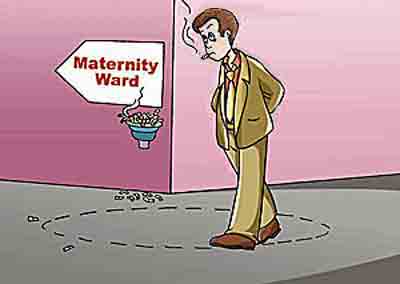ambulatory blood pressure monitoring
(s) (noun), ambulatory blood pressure monitorings
(pl)
Monitoring of a patient that allows the blood pressure to be recorded at regular intervals under normal living and working conditions and is useful to determine to what degree a patient's blood pressure falls at night compared to daytime values: Ambulatory blood pressure monitoring consists of prolonged blood pressure readings that are made while a patient does normal daily activities that will allow quantitative analyses of high blood pressure loads over different times and which can help distinguish between types of hypertensions; as well as, to determine the effectiveness of antihypertensive therapies.
ambulatory care
(adjective), more ambulatory care, most ambulatory care
A reference to health services that are provided on an outpatient basis: Those who visit a hospital, or another healthcare facility, and then go back home after treatment on the same day, are identified as being ambulatory care patients.
ambulatory electrocardiographic monitoring
(s) (noun), ambulatory electrocardiographic monitorings
(pl)
An essential tool in the diagnostic evaluation of patients with cardiac arrhythmias: The
ambulatory electrocardiographic monitoring is used to help determine whether someone has an otherwise undetected heart disease; such as, an abnormal heart rhythm (cardiac arrhythmia), or inadequate blood flow through the heart.
Specifically, ambulatory electrocardiographic monitoring can detect abnormal electrical activity in the heart which may occur randomly or only under certain circumstances; such as, during sleep or periods of physical activity or stress, which may or may not be picked up by standard, short-term electrocardiography performed in a doctor's office.
The main complaint that people have with ambulatory electrocardiographic monitoring is that the monitor may be cumbersome and interfere with certain activities; especially, sleeping; however, bathing and showering are not allowed during the monitoring period.
The signals of the ambulatory electrocardiographic monitoring are recorded on a cassette tape that runs slowly for a 24 hour recording, then the tape is quickly analyzed by a machine which stops when it detects any abnormalities in the recording.
ambulatory schizophrenia
(s) (noun), ambulatory schizophrenias
(pl)
A form of any of several psychotic disorders characterized by distortions of reality, usually of the simple but also additional symptoms of mood disorders: The person so afflicted with ambulatory schizophrenia usually manages for the most part to avoid being institutionalized.
ambulatory surgery
(s) (noun), ambulatory surgeries
(pl)
The medical treatment of an injury or other physical disorder by direct physical actions without the patient being admitted to a hospital: Ambulatory surgery is usually performed in the outpatient section of a medical center or in a physician's office and an overnight stay is not necessary; in other words, he or she can walk out and go home after the doctor's treatment.
ambulatory surgery center
(s) (noun), ambulatory surgery centers
(pl)
Medical facilities that are designed and equipped to handle surgery, pain management, and specific diagnostic procedures which do not require overnight hospitalization: Patients who are in relatively good health may choose to receive treatments at ambulatory surgery centers instead of having to stay overnight in a room and they will be treated by health professionals just as they would in a conventional surgery department.
ambuling
(adjective), more ambuling, most ambuling
Primarily a reference to communicants who are walking forward to the priest during the religious communion that is being celebrated by the communicants: The Christian ceremony in which ambuling members of a church are going to the priest who will serve them with bread and wine to drink as they commemorate or remember the last supper of Jesus Christ.
Ambulocetus natans
(s) (noun) (a plural that functions as a singular)
An early cetacean (marine mammals commonly known as whales, dolphins, and porpoises) that could walk as well as swim: The Ambulocetus natans is the only species classified under the genus Ambulocetus and because it had the appearance of a 3 meter (10-foot) long mammalian crocodile, it was obviously amphibious.
ambulomancy
(s) (noun) (no pl)
Divination by observing how someone walks: Ambulomancy was explained by Dr. Small as foretelling the future by walking in circles!
ambulomania
(s) (noun), ambulomanias
(pl)
An abnormal desire to go for extended walks at every opportunity.
ambulomantist
(s) (noun), ambulomantists
(pl)
A person who uses walking as a means of foretelling future events.
ambulophobia
(s) (noun) (no plural)
An abnormal concern of walking anywhere, anytime: Doug was getting older with time and, being a senior citizen and having developed an ambulophobia, he tried to avoid going places by foot because he dreaded falling down, not being able get up again, or even breaking his bones!
anteambulate
(verb), anteambulates; anteambulated; anteambulating
To walk before or in front of someone or something.
anteambulation
(s) (noun), anteambulations
(pl)
A situation in which someone walks in front of another person, or people; or something.
circumambulate
(sur" kuhm AM byuh layt) (verb), circumambulate; circumambulated; circumambulating
1. To walk around something continuously: James was so nervous before his oral test that he couldn’t sit still, so he
circumambulated countless times before he was called in by the professor.
2. To avoid the point of a subject or discussion: Timothy noticed that Jack was
circumambulating the main aspect of the topic, which needed to be decided on, and asking questions which were not relevant to the important issue at hand.

Jerome was nervously circumambulating at the hospital as he was waiting to hear from his wife about the birth of their child.



